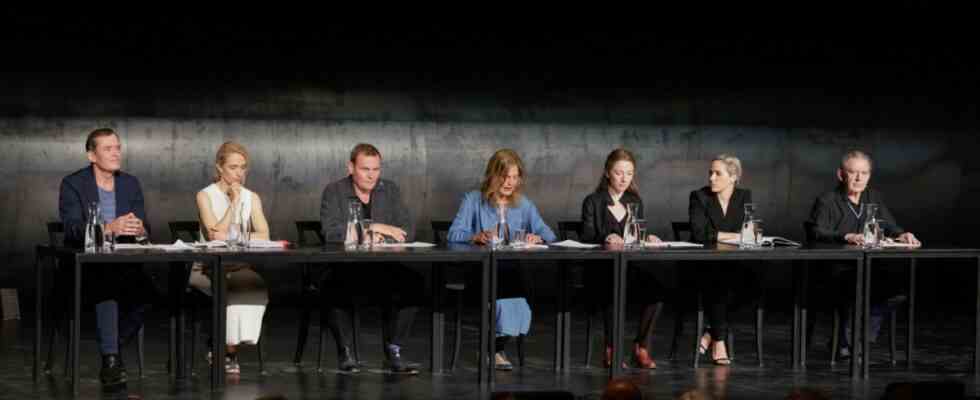The beginning is of compelling ease. Seven people, seven carafes of water, seven chairs, one table. There they sit, who will now master Dante Alighieri’s “Divine Comedy” in a marathon reading. Six hours are planned, it will be six and a half. The stage is that of the Max-Schlereth-Saal of the Mozarteum, this year alternative accommodation for the State Theater, which is currently being renovated. A modern hall, a functional hall, in the background the stage design of “Crazy for Solace”, which is also played here; the stage set is a large steel tube.
Each time a different tone, a different approach
Angela Winkler begins. With her never-ending charm of a young girl, who initially struggles with the technology of the microports, “I was just on the toilet, maybe something slipped there”, it doesn’t work, finally she hands it over Verena Altenberger, the current paramour, a regular microphone like a trophy. Dante’s Journey through Hell and Purgatory to Paradise is a first-person narrative, here in seven different voices. And that’s the compelling thing: each and every one reads a chant from the Hell department first, seven times a different tone, a different approach. With some of them you hear the roles they are playing in Salzburg, no, you don’t listen to them, you just think about them, especially with the three who are playing here in “Crazy for Consolation”. They also play animals in it, they don’t do that here.
Winkler is followed by Devid Striesow, clear, virile, almost a hero in an adventure story. Then Altenberger, sincerely warm, lively – she will not give up this attitude until the end, it seems completely resistant to the duration of the event. And she listens most curiously to others, so you watch her listening and you are forced to listen carefully yourself. Then comes Jörg Ratjen, professional reading voice, somehow a bit too busy. Kathleen Morgeneyer rather cultivates the style of the litany with strange, theatrical outbursts, Ursina Lardi is an objective reporter. And then there’s André Jung, the wonderful one, who often misreads it, but gives each word a different color, so meticulously fine that you’re spellbound.
You get lost without a dramaturgical framework
All seven are through with a song, then slowly begins an erosion. The cast changes, five disappear at once. Now a voice sometimes reads several songs in a row, the colors become more monochrome. And more than the fascinating how, one begins to think about the what, about the tweaks and twitches in hell, about the thousand encounters with mythical figures. And you’re looking for an idea that doesn’t exist.
Bettina Hering, head of drama at the Salzburg Festival, has a thing for long readings like this. One remembers Musil’s “Man without Qualities”, James Joyce’s “Ulysses”, novels which one repeatedly failed to read, but after reading them one believed one knew oneself very well. Now Hering has set up the text in Hartmut Köhler’s wonderfully direct prose translation, but what did she do? Much too little. She takes almost half of the total of 100 songs, her selection seems random, she leaves the songs in her, so the impression, untouched. It’s meandering without a destination. On the way, one is happy about Dante’s indignation, for example about the greed of the people and the pomp of the bishops. But without a dramaturgical framework, you get lost. In the end, all seven lead into a song of worship, which was perfectly fine with Dante 700 years ago, but today seems like a song behind closed doors that you can’t get open, don’t even want to open. In the end, love remains, at least that. And the great joy of the readers at the perseverance of the listeners.

